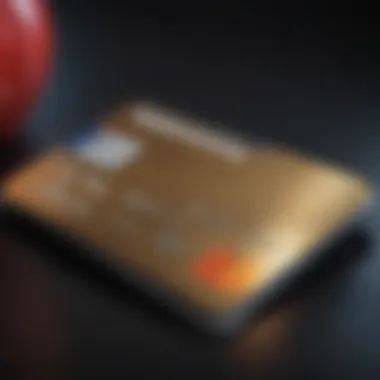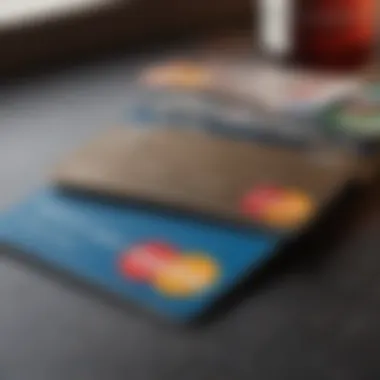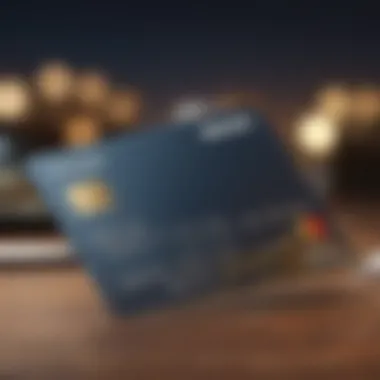Can You Pay Off Collection Debt with a Credit Card?


Intro
Navigating the waters of debt can feel like trying to steer a ship through a stormy sea. One aspect that often leaves many scratching their heads is how to deal with collections. Paying off collection accounts is a sensitive topic, especially when it comes down to the method of payment. Can a credit card help alleviate this burden? This article aims to shed light on putting credit cards to work when it comes to collecting debts.
When discussing this approach, it's essential to highlight the potential advantages and pitfalls. By understanding the mechanisms behind credit transactions and the implications they hold, individuals can make informed decisions that impact their financial health.
Debt doesn't just vanish overnight; it often lingers and festers, affecting various aspects of life. Hence, equipping oneself with knowledge can cut through the confounding details often associated with debt management.
Through this exploration, we will touch on critical concepts, offer expert advice, and consider whether credit cards genuinely serve as a viable tool in tackling collection accounts. As we delve deeper, you'll discover the various perspectives necessary for fostering better financial habits and improving credit scores.
Stay tuned as we embark on this journey to unravel the complexities of settling collections with plastic payment options.
Understanding Collections in the Context of Credit
Navigating the landscape of credit can be like traversing a troubled sea. When debts spiral, some might find themselves staring down the barrel of collection accounts. Understanding collections in relation to credit is crucial because it highlights not only the potential pitfalls but also strategies to regain control over one's financial standing. By grasping the ins and outs of collection accounts, consumers can make informed decisions that influence their credit scores and, ultimately, their financial future.
What Constitutes a Collection Account?
A collection account manifests when a debtor fails to meet payment obligations, prompting a creditor to transfer the mishandled account to a collections agency. This scenario typically unfolds after several months of missed payments. Now, when that collection account hits your credit report, it signals to lenders that you may be a risky borrower.
In most cases, the account could include:
*
- Credit card debt that’s past due
- Utility bills left unpaid
These accounts can stay on your credit report for up to seven years. Essentially, it’s like carrying around a black mark on your financial record, which can hinder your plans for big purchases or loans in the future.
Impact on Credit Score
The presence of a collection account can significantly dent a person’s credit score. The damage done largely hinges on several factors, including:
- The age of the account: Older accounts can weigh less as time passes.
- Your overall credit utilization: High utilization rates may make even a small account seem more detrimental.
When a creditor reports a collection, it can drop your score considerably. To put it plainly, if your score was soaring close to the golden 800 mark, a collection account could send it plummeting to below 600. That can sting, especially if you're contemplating financing a home or applying for a car loan.
"A collection account is like a storm cloud over your credit. The longer it hangs around, the more potential damage it can cause."
Common Types of Collections
It's essential to recognize that collections can come in various forms. Here are some common collections categories:
- Medical Collections: These often arise from unpaid bills from healthcare providers, which can unexpectedly derail one’s finances, especially during emergencies.
- Retail Collections: Often involve debts from credit cards issued by department stores or specific retailers. It can be surprising how fast these add up, particularly if interest rates are high.
- Installation Debt Collections: These arise when loan payments for appliances or furniture go unpaid. The allure of taking home a new refrigerator often fades when payment becomes unmanageable.
- Student Loan Collections: If you default on your student loans, it might not just impact your credit score—it could also affect your future job prospects, as some employers check credit history.
Understanding what constitutes a collection account, the ramifications for your credit score, and the kinds of collections that can crop up is fundamental for taking charge of one's financial journey. Armed with this knowledge, individuals can approach debt repayment strategies judiciously, ensuring they make the best moves for their unique situations.


The Mechanics of Credit Card Payments
Understanding the mechanics of credit card payments is crucial when considering the option of paying off collection accounts. This section breaks down how payments work, the intricacies of transaction processes, and fees that can arise. A well-informed perspective on these components empowers individuals to make strategic decisions about their financial health.
How Credit Card Payments Work
When you use a credit card to pay off a collection account, it’s essential to grasp the payment process. Generally, it involves the following steps:
- Authorization: When you swipe your card or enter your details online, the merchant sends the payment information to the bank to check if you have enough credit to cover the payment.
- Settlement: Once authorized, the transaction is sent through a network. The funds are transferred from your card issuer to the collection agency’s bank.
- Posting: The amount paid will appear on your credit card statement, and depending on your card terms, interest might be levied.
- Repayment: You then owe the payment amount back to the card issuer, often with interest depending on your repayment habits.
Many consumers may not understand the nuances of credit card repayments. They might think that simply making a payment clears the debt. However, the obligations to the credit card company remain. It's not as clear-cut as paying cash upfront.
Transactions and Fees
Using a credit card doesn't come free of charge, and understanding the potential fees is paramount. Here are key aspects to consider:
- Transaction Fees: The collection agency may impose a fee for processing credit card payments, which could negate the benefits of paying off the collection. It’s important to inquire if such fees apply in your situation.
- Interests Rates: For many credit cards, interest rates on unpaid balances can be quite steep. If the payment isn’t managed properly, the debt could balloon rather than shrink.
- Convenience Fees: Sometimes, there’s an additional convenience fee just for using a credit card. This fee could be flat or a percentage of the amount being paid, adding an unexpected layer of cost.
- Impact on Credit Utilization: Paying off collections with a credit card might improve your credit utilization ratio, but if the balance carried on your card remains high, that could hurt your score instead.
"Every dollar counts, and understanding where that dollar goes can mean the difference between debt relief or a new financial pitfall."
Pros of Paying Off Collections with a Credit Card
Using a credit card to pay off collection accounts has its share of advantages that might appeal to many consumers. While it’s important to navigate this option with care, understanding the benefits can help individuals make informed decisions about their financial health. Each person’s situation is different, but examining the potential benefits can provide clarity. This section delves into the conveniences, rewards, and advantages for credit utilization that stem from this method.
Convenience of Payment
One of the primary reasons people consider paying off collections with a credit card is sheer convenience. Think about it: most people carry their cards everywhere, making it easy to manage payments without the need to find physical cash or write checks. The transaction process is usually quick, while many creditors accept credit card payments, streamlining an often cumbersome task.
Moreover, many consumers appreciate the ability to pay bills online, as this allows them to track their payments in real-time without any hassle. In a fast-paced world, the ability to settle debts with just a few clicks cannot be understated. This option provides peace of mind, knowing that you can handle old debts efficiently, and as the saying goes, "desperate times call for desperate measures."
Potential Benefits to Credit Utilization
When considering credit utilization, paying off collections with a credit card can be a strategic move to enhance one’s credit score. Credit utilization refers to the ratio of credit being used compared to the total credit available. By paying off a collection account, especially one that may have been affecting your score, you could potentially lower your utilization ratio.
It’s worth noting that an improved credit score offers an array of future benefits including better interest rates on loans and credit cards. An improved score opens doors to a range of financial products, allowing consumers to elevate their status in this realm. However, it’s not just about improving your score; the act of paying off these accounts showcases responsibility to future creditors, hinting that you've learned from past mistakes.
Rewards and Cashback Opportunities
Many credit cards come with rewards programs that can be advantageous when paying off collections. Some people might be under the impression that using a credit card solely for debt repayment isn’t worth it, but discounts and cashback can lead to unexpected perks. For instance, certain cards may offer a percentage of cash back on transactions. In simpler terms, a small portion of your payment could return to your pocket.
Moreover, accumulating points from these payments may lead to larger rewards like travel, merchandise, or even further financial return through various deals that many credit card companies offer. It creates a situation where spending can ultimately generate benefits instead of being merely a financial drain.
"The art of managing your debt can sometimes lead to unexpected rewards."
While the benefits might seem enticing, it’s critical for individuals to carefully assess their overall financial situation before jumping in. Not all credit cards are created equal, and knowing the terms, fees, and interest rates of your card is essential. The lure of convenience and rewards should not overshadow the responsibilities tied to using credit cards, particularly in managing collections.


Cons of Paying Off Collections with a Credit Card
When considering the option of paying off collection accounts with a credit card, it is essential to weigh the potential downsides. While this method may seem appealing at first glance, it can lead to some pitfalls that could negatively affect your financial journey. Understanding these cons is crucial as it enables you to make informed decisions and helps avoid common missteps.
Debt Accumulation Risks
The most immediate concern when utilizing a credit card for settling collection accounts is the risk of accumulating additional debt.
Unlike cash or direct bank transfers, credit card payments create a revolving line of credit that can be easily mismanaged. Once you pay off the collection debt with a card, you might find yourself tempted to use that credit for other purchases, leading to a slippery slope of increased spending. With little self-discipline, this might spiral into an extended cycle of debt.
Moreover, if you find difficulty in paying off the credit card balance, interest charges can quickly snowball. It’s a bit like throwing good money after bad if you’re not careful—one debt leading to another.
Impact on Long-term Financial Health
Utilizing credit cards to clear collections might provide a short-term solution but can pose long-term repercussions for your financial wellbeing. For starters, it keeps your reliance on credit strong, which may ultimately hinder your ability to create a sustainable financial plan. Constantly switching debts from one card to another can lead you to miss the bigger picture of financial stability.
Additionally, if you abruptly shift from owing one creditor to another without resolving the root cause of your financial issues, you’re merely putting a band-aid on a deeper problem. This could also mean you're less likely to adopt healthy financial habits, like budgeting and saving.
"Managing debt wisely requires understanding it's not just about surviving the day; it's about planning for tomorrow."
Potential for Increased Interest Rates
Another significant drawback of paying off collections with a credit card is the potential for increased interest rates. Most credit cards carry higher interest rates compared to other forms of secured loans. If you fail to pay your balance in full by the due date, you may be looking at hefty interest fees that stack on top of your existing debt.
In many cases, credit card companies tend to charge even higher rates if they notice consistent late payments or if your credit score marks changes due to high utilization. The risk lies in the possibility that what started as an attempt to become debt-free could lead you into the weeds of overwhelming interest.
In summary, although using a credit card to settle collection debts may offer immediate relief, the potential consequences call for a thorough evaluation. It's vital to keep the focus not only on paying off collections but also on maintaining a sound financial strategy.
Alternatives to Credit Card Payments
When it comes to dealing with collections, using a credit card might seem like a convenient option on the surface. However, it’s crucial to explore other avenues as well. By evaluating alternatives, individuals can often find less risky and potentially more beneficial ways to manage their debt. Let's dive into some of these options.
Negotiating Payment Plans
One viable alternative is to negotiate a payment plan directly with the collection agency. It’s not uncommon for these agencies to be open to discussions. They'd prefer to recover some of the debt rather than nothing at all. Here are key steps to consider when negotiating:
- Understand Your Budget: Before entering negotiations, it’s important to know what you can realistically afford to pay each month. This sets a clear boundary for your discussions.
- Be Honest: When speaking with the creditor, honest communication about your financial situation can foster understanding.
- Request Lower Payments: You can propose smaller payments over an extended period. Many collectors understand that life can happen, and they may be willing to accommodate your request.
- Confirm Terms in Writing: Once an agreement is reached, make sure to get everything in writing to avoid future disputes.
"Negotiating is about creating a win-win situation. You want a manageable payment; they want to ensure they get something back."
Debt Settlement Options
Debt settlement can also serve as a practical route to consider. This involves negotiating with the creditor to pay a portion of your total debt in a lump sum, which is often lower than the full amount. The pros and cons of this approach include:
- Pros:
- Cons:
- Reduced Total Debt: Settling can lead to significant savings, especially if done wisely.
- Faster Resolution: It allows you to resolve debts faster than if you stick to a traditional payment plan.
- Impact on Credit Score: Settlements can negatively affect your credit history, making it essential to weigh this option carefully.
- Tax Implications: Sometimes, the IRS treats forgiven debt as taxable income, which can lead to unexpected tax bills.
Using Personal Loans for Debt Clearance
Another approach to consider is using personal loans to clear collection accounts. This can often lead to lower interest rates compared to credit cards, facilitating a more manageable repayment process. Here’s how it works:


- Evaluate Loan Terms: Different lenders offer various terms, including interest rates and repayment periods. Researching these options is paramount.
- Consolidation Potential: A personal loan can sometimes be used to consolidate multiple debts, reducing the number of payments and streamlining your finances.
- Improvement of Credit Score: By settling collections with a personal loan, you may improve your credit score over time as you manage repayments responsibly.
Strategic Approaches to Managing Collections
Navigating the world of collections can feel like wandering through a maze, especially if you're grappling with a collection account affecting your credit health. Adopting strategic measures when dealing with these collections is paramount. Not only does it help in regaining financial stability, but it also serves to safeguard your credit score. In this section, we’ll delve into the specifics of how to tackle collections effectively. The aim here is to empower readers to make informed decisions that will ultimately pave the way for a healthier financial future.
Assessing Your Financial Situation
Before implementing any strategies, it’s crucial to take a good hard look at your financial situation. This means gathering all your financial documents—think bank statements, income details, and obviously, your outstanding debts.
Understanding where you stand will help you to discern how much you can realistically allocate towards clearing those collection accounts without sinking deeper into debt. Some key steps you might consider include:
- List all debts: Include the amount owed, due dates, and interest rates.
- Create a budget: By tracking your income and expenses, you can create a clear budget to determine how much money you can spare for repayment.
- Check your credit report: Obtain a copy of your credit report to understand the full scope of how these collections are impacting your credit score.
Getting this foundational assessment right gives clarity, helping you devise the most suitable path forward.
Developing a Repayment Strategy
Once you've assessed your financial landscape, the next logical step is formulating a solid repayment strategy. The goal here is not only to pay off collections but to do so in a way that minimizes the negative effects on your overall financial health.
Consider implementing the following approaches:
- Snowball Method: Focus on paying off the smallest debts first while making minimum payments on larger ones. This could ignite a sense of accomplishment and motivate you to tackle the larger debts.
- Avalanche Method: Prioritize paying off debts with the highest interest rates. It might take longer to see progress, but in the long run, it'll save you money on interest payments.
- Negotiate with collectors: Sometimes, collections agencies may be open to settling for less than what you owe. It's worth the effort to reach out and discuss possible payment plans—after all, they want to collect something.
Each of these strategies requires discipline and a commitment to sticking to your plan. It's all about working smarter, not harder.
Resources for Financial Guidance
While handling collections can be stressful, fortunate for you, there are numerous resources designed to help you navigate this complex landscape. These resources can provide essential guidance, tools, and support. Below are some valuable options to consider:
- Credit Counseling Services: Non-profit organizations often offer free or low-cost advice to help you develop a manageable repayment plan. They may also provide sessions that delve into budgeting and financial planning.
- Financial Books: Titles such as The Total Money Makeover by Dave Ramsey or Your Money or Your Life by Vicki Robin provide solid insights on managing finances.
- Online Communities: Websites like Reddit have forums where individuals share experiences and tips related to dealing with collections and credit issues.
With the right strategies and resources at your disposal, you can transform how you manage collections, shifting towards a more balanced and informed financial future.
Finale and Final Thoughts
Navigating the waters of debt repayment can feel like trying to find your way through a dense fog. Paying off collections with a credit card offers some practical avenues, but it is essential to weigh the decision carefully. This topic, explored extensively in this article, reveals not only the potential benefits but also the risks that come along for the ride.
First off, understanding the implications of using a credit card to settle collection accounts can empower consumers. For those new to financial management or seasoned investors alike, it’s not just about the immediacy of clearing a collection; it’s about the longer-term impact on your credit health.
When contemplating this route, consider the financial landscape before you – a credit card can indeed serve as a convenient payment option. Yet, you should also ponder the shadow of interest rates. The debt accumulation risks can snowball faster than you might expect. If not managed with a savvy hand, you might end up digging yourself deeper into a financial hole.
Moreover, this conclusion emphasizes the strategic aspect of debt management. Developing a personalized repayment strategy, informed by one’s financial circumstances, can mean the difference between sinking into further trouble or swimming towards financial stability.
Many consumers often overlook alternative methods, such as negotiating payment plans directly with collectors or seeking debt settlement solutions. These paths can sometimes provide less taxing routes to financial freedom, and they often come without the hefty price tag of accumulating interest.
In summation, understanding the dynamics of using credit cards for settling collections equips the reader to make informed choices. This article serves not just as a guideline but as a foundation for fostering financial acumen. The insights here aim to clarify the risks and rewards associated with paying off collections, serving as a reminder that knowledge is power in the realm of finance.
"The simple act of paying attention can take you a long way." - This rings true, especially when it comes to understanding one’s financial decisions.
In closing, whether you opt for credit card payments or explore alternatives, let this guide serve you well. Stay informed, assess your options wisely, and don’t hesitate to seek professional advice from financial guidance resources.



